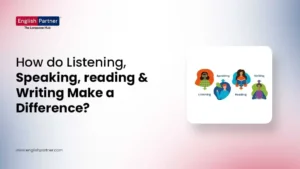English for Beginners – 6 Simple tips

Yashik
Content Creator
Last Updated
July 18, 2025

Go back to a bustling Thai market and picture yourself negotiating for a hand-woven scarf. The dealer speaks English well, you notice at once! It’s possible that you’ll come across funny memes on social media that you find confusing.
These are but a few explanations for why English is an invaluable language for travelling the globe. Yes, English is the language of international news and economic negotiations, but it can do so much more! It’s essential to comprehending your favourite foreign musicians, making connections with people from diverse backgrounds, and eventually grasping the gags in those internet videos.
You may want to read a book by your favourite foreign author, watch your favourite movie without subtitles, or simply stay in touch with a friend you haven’t seen in a while. Whatever your reason for wanting to study, it’s an enjoyable hobby that will improve your cognitive abilities. Alternatively, you may consider providing educational resources to a class or acquaintance who want to improve their English language skills.Here are six easy tips to make the most of your English learning experience.
Define language learning goals:
You should set certain goals and standards before you even start learning the English language. Establishing and meeting goals will help you keep yourself accountable and develop a thorough learning strategy. Your objectives should be determined by your level of language proficiency and the resources available to you (such as planned classes or the chance to study abroad). The Learn English tenses of developing language competency, such as improving your vocabulary, pronunciation, reading comprehension, and writing ability, should also be taken into account. Setting goals is beneficial for all language learners, including you and your students. The English learning objectives listed below should thrill language learners.
Provide appropriate and useful advice:
Before we get into the details of teaching English to beginners, we need to consider what you should teach. The first and most important thing you can do is choose a topic that is appropriate for your kids. Because they seem like a simple and easy place to start, tutors frequently start teaching lexical sets—which include objects like numbers, animals, and food items—first. But novices are not given the material to form sentences and use the language, and learners often find this language meaningless.
Access Information in Multiple Formats
Converse with English speakers
It is one thing to know a language; quite another to be able to communicate in it. Practice with English native speakers to put what you’ve learned into practice! You will feel more at ease with all Learn English tenses language learning—pronunciation, understanding, circumlocution (using synonyms for words you don’t know or can’t remember), and the skill of turning ideas into responses—if you engage in straightforward, ordinary discussions.
Read everything you can!
Select which errors need to be fixed:
Final Thoughts:
Yashik
Yashik is a dynamic content creator and persuasive copywriter who blends creativity with strategy. With a strong focus on audience engagement and digital impact, he crafts content that builds trust, drives traffic, and delivers results.

Frequently Asked question?
Find a safe space to practise! Talk to yourself in English, or find online language exchange platforms where you can connect with other learners. Remember, everyone makes mistakes, and most people will appreciate your effort to communicate.





